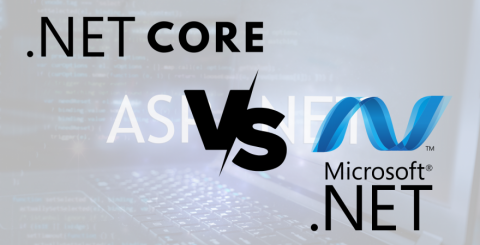What Is the Difference Between Net Framework vs Net Core?

Technology is ever-evolving, and as developers, we should always be on the lookout for new advancements so that our applications can be as user-friendly and efficient as possible. However, not all advancements are promising.
Different technologies have emerged to fill various needs in the world of software development. NET Core and NET Framework offer two distinct but equally valid options for building applications.net core is an open-source platform that enables cross-platform development. In contrast, the NET Framework is a proprietary platform that can only be used on Windows systems. Both options have their pros and cons, but ultimately it comes down to what the developer is looking for.
With the release of .NET Core 2.0, it’s essential to be aware of the differentiating factors that set it apart from its predecessor, .NET Framework. .NET Core is an open-source platform that enables cross-platform development. At the same time, the .NET Framework is a proprietary platform that can only be used on Windows systems. Both options have their pros and cons, but ultimately it comes down to what the developer is looking for. If a developer is looking for a more portable platform for multiple operating systems, then .NET Core is an excellent option.
In the .NET framework vs. .NET Core evaluation, the question becomes: Which is suitable for your project? Let’s find out further with this blog read.
What is .NET Framework?
.NET Framework has been around for quite some time, and it’s a framework created specifically for Windows development.NET Core, on the other hand, was released as an open-source platform enabling cross-platform development. While both frameworks have pros and cons, .NET Core offers more flexibility and ease of use. If you’re looking for a development platform for multiple operating systems, then .NET Core is perfect.
What is .NET Core?
.NET Core was created as a newer version of the .NET domain that addresses the limitation of the .NET Framework. Whereas the .NET Framework is a proprietary platform that can only be used on Windows systems, .NET Core is an open-source platform that enables cross-platform development. This makes it a more versatile and portable solution, perfect for projects that must be used on multiple operating systems.
Critical Differences in .Net Core Vs. .Net Framework
Compatibility
The best thing that makes .NET Core stand out from the rest is its compatibility with multiple operating systems — Windows, Linux, and macOS. This enables developers to write code and build applications that can be used on any platform with minimal effort. Furthermore, it also provides an easy upgrade path for existing applications, allowing them to take advantage of the latest features and improvements. Additionally, .NET Core offers better performance than the .NET Framework as it is built on a much newer version of the CLR (Common Language Runtime).
On the other hand, .NET Framework offers a restrictive model, which allows running websites, apps, and web services only on the Windows operating system. This makes it a more versatile and portable solution, perfect for projects that must be used on multiple operating systems. However, this model can be limiting, as it doesn’t offer support for web development on other platforms. With the release of .NET Core 2.0, developers can now use a more open-source platform that supports cross-platform development.
Performance
With the release of .NET Core 2.0, it’s essential to be aware of the high scalability and performance that the latest framework version demonstrates. Not only is it recommended by Microsoft, but it’s also one of the most scalable and fast platforms available out there. This makes it an ideal choice for high-performance systems, whether using ASP.NET Core or any other .NET Core frameworks. In addition to its high scalability, .NET Core 2.0 offers improved performance compared to its predecessors.
Deployment
In addition to its high scalability and performance, .NET Core 2.0 offers a quick and simple deployment process. Whenever the latest version of .NET Core gets launched, it can be instantly updated on one machine at a time, getting uploaded to new directories without affecting the existing applications. This makes it ideal for projects that need to be updated frequently or for large deployments.
Deployment on the .NET Framework is restricted to Internet Information Server (IIS) only. If you want to deploy your web application on a different server, you will need to use another platform, such as GlassFish or Nginx. Although this limitation may seem a disadvantage initially, it offers some significant benefits. For example, IIS is the most widely used web server and is frequently found on most corporate Intranets.
Application types
The .NET Framework is an excellent choice for projects that need to run on Windows and is supported by a wide range of tools and APIs. It helps build Windows Presentation Foundation, Windows Forms, and ASP.NET applications for the Windows platform. It also comes with its libraries and CLRs targeted explicitly to Windows applications. This makes deployment on the .NET Framework much more straightforward than with .NET Core, as many web servers and services already support it.
.NET Core is Highly Useful for Building Web Apps, ASP.NET Core Apps, and Universal Windows Platform Apps.With its support for cross-platform development, a more versatile and portable solution, and high scalability and performance, .NET Core is an ideal choice for building web applications, ASP.NET Core apps, and Universal Windows Platform apps.
Library collection
Several class libraries can commonly be used for apps created with the .NET Framework to facilitate basic functions like DB interaction, XML doc manipulation, graphic rendering, and file writing/reading. These libraries are made available as part of the installed base, which makes it easy to get started with most projects. In addition, many third-party libraries are available that can be used to extend the functionality of apps created with the .NET Framework.
NET Core also comes with CoreCLR – the rebuilt common language runtime, allowing developers to choose and use only the needed libraries for their respective apps. This makes it a more versatile and portable solution, perfect for projects that must be used on multiple operating systems.
Mobile App Development
Although the .NET Framework is an excellent choice for developing desktop applications, it’s unsuitable for building mobile apps. This is because the needed runtime and tools are not available on mobile platforms, and the app development process is significantly more complex than with .NET Core.
.NET Core supports all the essential stages of mobile app development, from developing the core app logic to packaging and deploying it to the mobile platform of your choice. This makes it a more versatile and portable solution, perfect for projects that need to be used on multiple operating systems.
CLI Tools
Some of the most common command line tools used with the .NET Framework are the dotnet command line tool and the aspnet command line tool. Although they are both powerful and widely used, they have their drawbacks. For example, the dotnet command line tool is quite heavy for CLI (Command Line Interface) and can be slow when used in large deployments. Additionally, its availability on a wide range of platforms makes it challenging to target a specific platform.
.NET Core is designed to be lightweight and fast, making it an excellent choice for developers who want to quickly get projects off the ground. It also offers a Command Line Interface (CLI) tool, which allows developers to get started with minimal setup and configuration. The CLI has a range of commands for creating, building, and running applications, making it a great way to quickly get up and running with .NET Core. Additionally, the CLI supports a range of standard tools, such as NuGet, Visual Studio Code, and the .NET Core SDK, allowing developers to create apps without needing to configure them manually.
.NET Framework vs .NET Core: Which Should You Pick, and When?
Although the two frameworks have their strengths and weaknesses, it’s clear that .NET Core definitely has a significant edge over the .NET Framework by saving developers’ resources and time. In addition, .NET Core offers a more versatile and portable solution, perfect for projects that need to be used on multiple operating systems. Furthermore, the lightweight and fast nature of .NET Core makes it a great choice for developers who want to quickly get projects off the ground.
In reality, .NET and .NET Core are distinctive in their ways, and deciding which is the better depends on your project requirements. If your project only needs to run on Windows, then the .NET Framework will be a better choice. However, if your project needs to be portable and run on multiple operating systems, then .NET Core is the better option.
Final call
Without a doubt, the debate between .NET Framework and .NET Core will continue to rage on, as both are potent solutions in their respective fields. This is why it is crucial to work with experienced .NET developers who can help you assess your business needs and recommend the right solution. Developers are well-versed in both .NET Framework and .NET Core and can help you decide which technology is right for your project. They can advise on best practices and ensure the application is reliable, secure, and scalable. With our team’s expertise, you can get the most out of your application while keeping within budget.
Similar Articles
Explore the power of Scala in modern web development! Discover its advantages, best practices, and real-world case studies. Elevate your coding journey today.
Do you know 24% of retail purchases will be online by 2026? Hence, eCommerce development is the trend, providing lucrative business opportunities to budding entrepreneurs. However, developing an eCommerce website is not an offhand process.
Wave goodbye to the cost and efforts of separate web application development for every operating system out there just to reach your customer base. Progressive Web Apps (PWAs) are here to open up a whole new world of accessibility for you.
Your website is the center of your business’s digital ecosystem, just like a brick-and-mortar shop. What matters here is the perception of the prospective customer visiting and the experience one is taking away.
When you are an entrepreneur, every decision you make needs to be well-informed and strategic. As every decision you make will impact your bottom line and your ability to grow. That's why thinking carefully before choosing any eCommerce platform is essential.
Are you a business owner planning to establish an online presence but unsure of the web development cost? A well-designed and functional website is crucial for a business’s success. However, determining the cost of web development is one of the common challenges faced during the website development process.
The increasing prevalence of cyber threats and the potential risks associated with data breaches make it crucial to implement robust security measures. This helps protect your business, customer information, and brand reputation.
In the age of digital technology, every business must have an online presence. A website is crucial in establishing this presence, making web development an integral part of modern business. To create a successful website, choosing a reliable web development platform is imperative.
App developers have discovered React Native app development to be the key to building robust mobile applications, a trend that has increased since 2015.





e6f0.png)



